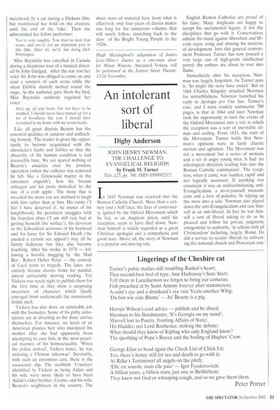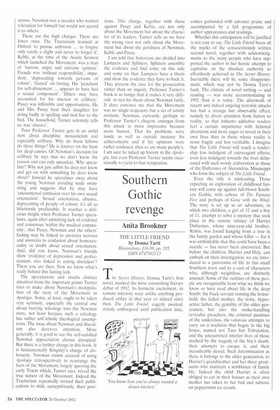An intolerant sort of liberal
Digby Anderson
JOHN HENRY NEWMAN: THE CHALLENGE TO EVANGELICAL RELIGION by Frank M. Turner Yale, £25, pp. 740. ISBN 0300092512 In 1845 Newman was received into the Roman Catholic Church. More than a century and a half later, the fires of controversy ignited by the Oxford Movement which he led, as an Anglican priest, until his reception, seem to have died down. Newman himself is widely regarded as a great Christian apologist and a sympathetic and good man. Above all, the story of Newman is a popular and moving tale. English Roman Catholics are proud of his fame. Many Anglicans are happy to accept his sacramental legacy, if not the disciplines that go with it. Conservatives admire his stand against liberalism and liberals enjoy using and abusing his doctrine of development. Into this general contentment Professor Turner has now poured a very large can of high-grade intellectual petrol: the embers are about to roar into flame.
Immediately after his reception, Newman was largely forgotten. As Turner puts it, 'So might the story have ended.' But in 1864 Charles Kingsley attacked Newman for untruthfulness. Newman launched his reply in Apologia pro Vita Sua. Turner's case, and I must crudely summarise 700 pages, is that in 1864 and later Newman took the opportunity to turn the events of the Oxford Movement into a tale to which the reception was a sort of inevitable climax and ending. From 1833, the start of the Movement, Turner holds that Newman's opinions were in fairly chaotic motion and agitation. The Movement was not a movement but a series of motions and a set of angry young men. It had 'no teleological direction leading him into the Roman Catholic communion', The reception, when it came, was 'sudden, rapid' and not logically necessary. If anything was consistent it was an undiscriminating antiEvangelicalism, a do-it-yourself monasticism and a love of polemic. In tidying up the mess into a tale, Newman also played down the anti-Evangelicalism and cast himself as an anti-liberal. In fact he was himself a sort of liberal asking to do as he pleased and follow his private judgment, antagonistic to authority, 'in schism with all Christendom' including, largely, Rome. He did a service to secular liberals by subverting the national church and Protestant con sensus. Newman was a seceder who wanted toleration for himself but would not accord it to others.
These are the high charges. There are lower ones. The Tractarians learned at Oxford `to pursue ambition ... to forgive only rarely a slight and never to forget it'. Keble. at the time of the Assize Sermon which launched the Movement, was a man of 'narrow, angry and extreme opinion'. Froude was 'without responsibility', impudent, 'deprecating towards persons of colour', 'fixated' on fasting. His 'penchant for self-abasement .. appears to have had a sexual component'. 'Illness may have accounted for his interest in celibacy.' Pusey was inflexible and opportunistic. He and Mrs Pusey beat their daughter for doing badly at spelling and tied her to the bed. The household, Turner solemnly tells us, was 'abusive'.
Poor Professor Turner gets in an awful stew about discipline, monasticism and especially celibacy. Why do these fellows do these things? He is forever on the hunt for deep causes. Of Newman's decision for celibacy he says that we don't know the reason and can only speculate. Why speculate? Why not just admit he does not know and get on with something he does know about? Instead he speculates away about the young Newman avoiding nude swimming and suggests that he may have 'encountered confusion over his own sexual orientation'. Sexual orientation, abusive, deprecating of people of colour: it's all so hilariously predictable. It reaches a delicious height when Professor Turner speculates, again after admitting lack of evidence and consensus 'within the medical community'. that Pusey, Newman and the others' fasting may be linked to anorexia nervosa and anorexia to confusion about homosexuality or doubt about sexual orientation. And, did you know, Newman's friends show 'evidence of depression and perfectionism, also linked to eating disorders'? There you are then. Now we know what's really behind this fasting lark.
The speculations and insults distract attention from the important points Turner tries to make about Newman's manipulation of the story of the Movement in Apologia. Some, at least, ought to be taken very seriously, especially the central one about burying teleology into the Newman story, not least because such a teleology has rather unCatholic theological assumptions. The issue about Newman and liberalism also deserves attention. More generally, it is good to see the self-satisfied Newman appreciation chorus disrupted. But there is a further charge in this book. It is fundamentally Kingsley's charge of dishonesty. Newman stands accused of using Apologia retrospectively to rearrange the facts of the Movement, largely ignoring the early Tracts which, Turner says, reveal the true nature of the Movement. Indeed the Tractarians repeatedly revised their publications to shift, surreptitiously. their posi
tions. This charge, together with those against Pusey and Keble, are not only about the Movement but about the character of its leaders. Turner tells us we have the wrong view not only about the Movement hut about the goodness of Newman, Keble and Pusey.
I am told that historians are divided into Lumpers and Splitters. Splitters assemble the evidence and find some on this side and some on that. Lumpers have a thesis and show the evidence they have to back it. They present the case for the prosecution rather than an inquiry. Professor Turner's book is so lumpy that it makes it very difficult to test his thesis about Newman fairly. It does convince me that the Movement was no single trajectory but a set of untidy motions. Newman, curiously, perhaps to Professor Turner's chagrin, emerges from this attack as more impressive because more human. That his problems were inside as well as outside increase his achievements and if his opinions were rather confused, then so are many people's. I am sure he tidied up history in the Apologia, but even Professor Turner seems occasionally to yield to that temptation.



















































































 Previous page
Previous page